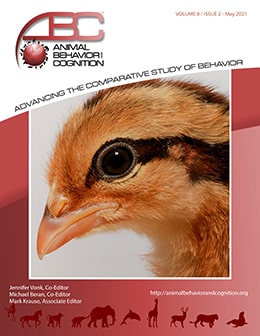Vol 8, Issue 2, May 2021
Humans' Ability to Assess Emotion in Dog Barks Only Slightly Affected by their Country of Residence, a Replication of Pongracz et al. (2005) in a Portuguese Sample
Citation
Silva, K., Faragó, T., Pongrácz, P., Romeiro, P., Lima, M., & de Sousa, L. (2021). Humans’ ability to assess emotion in dog barks only slightly affected by their country of residence, a replication of Pongrácz et al. (2005) in a Portuguese sample. Animal Behavior and Cognition, 8(2), 107-123. https://doi.org/10.26451/abc.08.02.02.2021
Abstract
An original experiment by Pongrácz et al. (2005) showed that Hungarian listeners were able to categorize recordings of dog barks recorded in various contexts above chance level and assessed the barking dogs’ emotional state in accordance with these contexts. The present study sought to replicate this experiment in a Portuguese sample. Similar to Hungarians, Portuguese dog owners and non-owners rated the barks in accordance with their specific social contexts (e.g., a dog left alone is most probably in fearful state instead of a playful one), and correctly categorized territorial and separation barks above chance level. Similar error patterns were observed across subjects from the two countries. The Portuguese participants, however, were less successful in categorizing barks than the Hungarians. Additionally, results showed both sex and dog ownership effects. Women from both countries tended to attribute higher levels of despair to all bark recordings. Moreover, within the Portuguese sample, dog-owners were generally more accurate in categorizing the recordings than non-owners. Overall, the results of our replication study, besides supporting the universality of vocal emotion recognition in mammals, calls attention to the possibility of country/culture- and also individual-specific effects on human perception and understanding of nonhuman vocalizations.
Keywords
Acoustic communication, Bark, Cultural differences, Domestic dog, Emotion
